Press Advisories
28. 8. 2023 13:29
Speech by Prime Minister Fiala at the regular meeting of Czech ambassadors
Dear Ambassadors, Dear Minister, Ladies and Gentlemen,
I am delighted to be able to address you again after a year at the beginning of the traditional meeting of the heads of the embassies. The year which we have passed was extremely challenging. The Czech Republic was at the helm of the Council of the European Union in a situation where Ukraine, but also Europe and the entire Western community are resisting Russia. The chances for a quick resolution of the conflict are getting less and less probable. The consequences of Russian aggression are multiple and are increasingly contributing to a certain nervousness in our country. And they make extraordinary demands on you and on our people in the Foreign Service.
In addition, the Foreign Service has had a difficult time with the untimely and unexpected departure of several of your colleagues whose skills we will miss. I am glad that we have now observed a minute's silence in their honour. I have had the opportunity to get to know some of them personally and to appreciate their professionalism and human qualities for many years.
In the speech I delivered in this chamber a year ago, I called up on us to work together patiently to improve the Czech Republic's reputation abroad, because that is a condition for our success in the world.
And this is where we have done a great deal of work together. Today we are much better than before at coordinating the country's foreign policy so that it speaks with one voice. This is also a credit to Minister Lipavský, whom I would like to thank for his daily commitment. The change in the office of the President of the Republic has also manifested itself. It has allowed us, for example, to resume regular meetings of the highest constitutional officials on foreign policy and some other steps that make our Republic more united and clearer in foreign policy.
And with the brand new position of National Security Advisor, we are able to put foreign policy in a broader context and connect it to domestic priorities, which – I firmly believe – also means that citizens can better identify with foreign policy and better understand the steps we are taking in foreign policy.
The results are obvious and speak for themselves. Whether we are talking about prompt and exemplary assistance to Ukraine, a determined stance towards Russia, competent leadership of the European Union, influencing the future of the European economy, ensuring energy security, establishing new strategic relations or strengthening transatlantic cooperation – in all these areas, the Czech Republic has achieved extraordinary results with your help, and I want to thank you for that.
In fact, I could end here and wish you to continue this successful work, but I will not do that. In the time remaining, let me recall a few areas that are essential to the foreign policy of the Czech Republic today and on which we must particularly focus.
Today I have to devote most of my time to two topics – the first is security, or our security strategy, and also our prosperity, i.e. promoting exports and attracting strategic foreign investment to the Czech Republic.
I'll start with security. Growing instability, gaps in the security environment and increasing tensions in the functioning of the international system. These are the things we are facing, and they force us to take our security much more seriously than in the carefree years before the covid and the war in Ukraine.
The security of a medium-sized state like the Czech Republic is directly dependent on the nature of the international environment. More than ever, we must therefore sensitively pursue our defence interests, strengthen alliances and contribute to mitigating crises in the world.
One of our proven tools to contribute to general security is our foreign missions, and we have been very successful in them. Currently, we are focusing our forces mainly on the NATO Eastern flank, where our assistance is very effective and where our forces have proven themselves very well.
The new situation has also required us to revise our core strategic documents for the first time in some time, as we committed to do in our Programme Statement. The main result is a new security strategy, which the government approved this summer, and follow-up documents.
The security strategy tells us, quite unsurprisingly, that Russia's imperial policy remains the number one security threat to us. It is beyond debate that Russia's attempts to re-create spheres of influence must be stopped, otherwise they will embolden not only the Putin regime but also other aggressors.
It remains the case that we can only deter and isolate Russia together with our allies. Our strongest message to Russia is our unity. Let us bear in mind that this unity in a prolonged conflict may become increasingly costly, yet we must maintain and strengthen it. And let us not forget to be vigilant against the actions of China, which, by the way, is closely monitoring this conflict with a view to its own power ambitions.
From this point of view, but also from other security aspects, our position vis-à-vis Ukraine is also crucial.
For a year and a half, Ukraine has been defending not only its territory, but in fact fighting for the rest of Europe. Developments in recent months have repeatedly shown that the situation is very complicated. According to many analysts, the stalemate and the reality of a frozen conflict is also looming. I do not think that this is a scenario that we only have to follow, but it is also a scenario that we have to keep in mind and think about in our strategies.
Our task is to continue our civilian and military support to Ukraine and to support the process of Ukraine's integration into the EU and NATO. In this respect, we can pass on to Ukraine our experience from the pre-accession negotiations including the implementation of individual directives and regulations.
In parallel, we must prepare for post-war reconstruction. For this reason, my Government has established the post of Government Commissioner for the Reconstruction of Ukraine, who is actively working and coordinating the assistance of various state and non-state entities. A month ago, Commissioner Kopečný negotiated directly in Ukraine about the involvement of Czech companies in international aid. And these efforts must continue.
In the face of a prolonged conflict, we must prevent 'Ukraine fatigue' from undermining our resolve. We must constantly explain at all levels that our solidarity saves concrete lives and that it is necessary for all of us.
At the international level, Ukraine was one of the topics of my discussions during my business trip to Asia or during the EU-CELAC summit. Similarly, we need to talk about it with our African partners, as Ministers Rakušan and Lipavský have managed to do recently.
We must explain to our citizens, without whose consent we cannot do without, that helping Ukraine or Ukrainian refugees is not only right, not only important, but also a great opportunity for the Czech Republic. We have provided Ukraine with a lot of military equipment that we had in our warehouses that was not so useful to us anymore, but it is extremely useful to Ukraine, and this early donation has opened the way for us to significantly modernise our military and have our allies help us.
The growing exports and export licenses for our companies represent a great opportunity for the Czech economy. This has put the Czech Republic in a very good position for post-war reconstruction in Ukraine. Not to mention the positive benefits of Ukrainian refugees for our labour market, where more than 115,000 Ukrainian refugees are already employed.
All these items can be easily quantified and compared, but I do not want to do that here because the moral and political-security aspect is important. You understand well these dimensions of our policy, that this is not about accounting, but above all about substantial investment in the Czech-Ukrainian partnership and in a stable international environment, and this is vital and invaluable for us.
The next dimension I want to mention briefly is energy security.
Our energy policy has had to be changed from the ground up since my government took office. The most important thing was to end our energy dependence on Russia. Last year at this time, many people scared us that we would not have enough energy, that we would not survive the winter without Russian natural gas, that companies would go bankrupt.
Fortunately, none of this came true. On the contrary, today we are in a situation where we are almost completely independent of Russian gas, we practically do not need Russian gas, which is a credit to the correct and timely actions of our government, but it is also a credit to the professional work of many experts across the public administration.
However, the road to a definitive shift away from Russian fossil fuels is not yet complete. We have yet to be cut off from Russian oil, for which the expansion of the TAL pipeline must be completed. We expect this to take place by the end of next year.
And the last key condition for our energy independence is a complete switch to American and French fuel for our nuclear power plants. But everything is pointing to the fact that we will do without Russia and Russian energy completely in the foreseeable future, and in a time that we can already measure in months. This is extremely important from the point of view of the Czech Republic's energy security.
Our country is benefiting from the fact that the Czech Republic is becoming more and more anchored in Western supranational institutions, especially in the European Union and NATO. We are coping very well with the current challenges also thanks to the fact that we are finally fully aware of the importance of our membership in Western organisations.
Next year we will celebrate 25 years since the Czech Republic joined NATO and 20 years of our membership in the European Union. I hope that we will commemorate both anniversaries together and that they will also be reflected in your programmes in your embassies.
As far as our transatlantic relations are concerned, we can safely say that they are now the best in history. The conclusion of the Defense Cooperation Agreement (DCA) between the Czech Republic and the United States was of key importance. We have thus corrected a deficiency that the Czech Republic had as one of the last NATO member states.
The agreement gives both the Czech and American sides better legal certainty and creates a clear framework for future negotiations. It enables the Czech Republic to better contribute to the Alliance's collective defence system. And all this reinforces our security.
In addition, we are strengthening transatlantic cooperation in the EU-US Trade and Technology Council. We have gained an undeniable number of benefits from our membership – security, stability, a guarantee of prosperity, but also more opportunities to co-determine the future of our continent.
As far as relations within Europe are concerned, I am pleased that our successful presidency last year clearly and significantly contributed to the Czech Republic's better position in the European Union. We are now perceived as respected partners, we can, and do, have a stronger say in the shape of important proposals, our voice is taken seriously and we can defend Czech interests more effectively.
The presidency is over, but the political negotiations continue. Let me briefly recall two current topics in EU politics and where we stand on them.
The first is the reform of European asylum rules, or the new migration pact. It is urgently needed in the current situation. In June, we supported, and the Council approved, compromise proposals on two key parts of the pact. I am pleased that the current version of the proposal is entirely consistent with the long-standing position of the Czech Republic, i.e. not only with the preferences of this Government, but on this point there is a long-standing consensus that has been fulfilled by this compromise proposal for a pact. I can remind you that the proposal does not include mandatory relocation quotas, but instead introduces a mandatory border procedure and, overall, will allow European states to regain control over who they allow into the Schengen area. There are a number of other things that we have been advocating for a long time.
Another proof that the Czech Republic can effectively promote its interests in the European Union are the ongoing negotiations on the Euro 7 emission standard. The Czech Republic is currently leading a group of states that have joined together to support our constructive opposition to the European Commission's proposal. It is essential that, thanks to this coalition of interests, we now push through our realistic view, push through a view that is more sensible in terms of the future of the automotive industry and citizens, and convince the countries that are still undecided.
In addition to transatlantic and European cooperation, the Czech Republic must also strive to maintain good relations within the Central European region even in these difficult times. Right now, during our presidency of the Visegrad Group, we have a good opportunity to do so.
Our programme for the Presidency takes into account the diverse, sometimes very different, positions of the Visegrad Four countries on a wide range of issues, even different positions on Russian aggression against Ukraine. That is why we are focusing on practical cooperation, which is beneficial even at a time when political cooperation within all the Visegrad countries is more difficult, not to say impossible, but a bit more difficult. We must not underestimate this responsibility, because the development of our Presidency may be influenced by the upcoming parliamentary elections in Slovakia and Poland.
Nevertheless, it is in our interest that the Visegrad Group, as much as possible in the current situation, should function and build on all the good that has been achieved in the past through joint action. But it is also in our interest that Visegrad is not the only functional format for cooperation in Central Europe. We are interested in a broader Central European dialogue and this is also reflected in our foreign policy. In this broader Central European dialogue, strategic cooperation with Germany plays an important role, as does strengthening neighbourly relations with Austria.
In addition to security and strengthening alliance relations, which was the first priority I mentioned, it is absolutely crucial for our government and for our diplomacy to strive for our prosperity, to create all the conditions for us to be competitive as a Czech Republic. The tool you have in your hands is economic diplomacy.
Recent developments have made it clear that we need to further strengthen our trade and investment cooperation with trusted partners around the world. In accordance with the new export strategy of the Czech Republic, and this is another document that we have modified and prepared to meet today's challenges, we must actively seek new opportunities. We need to help Czech companies diversify their exports and we need to help them penetrate new, dynamic markets.
At the same time, the current global context is forcing us to think more strategically about the strength of our supply chains, to actively seek to protect them, to look for alternative routes and to find safety nets. We need to look for successful Czech companies and provide them with adequate support at various stages of trading. Here I can recall, for example, the growing importance of our defence industry in recent times and its increasing respect in the world. But the same applies to companies in the transport sector and many other areas where our companies are making a name for themselves. It is the strategic support that is an increasingly important role of our embassies, and I know from meeting many of you that you are well aware of this.
I try to open up new relationships personally, for example during the big Asia trip this spring. At the same time, we need to negotiate with EU Member States to speed up the ratification of trade agreements with key partners in the Indo-Pacific, Africa and Latin America. All of this is in the interest of the Czech Republic and the Czech economy, and we must convince our EU partners that it is beneficial.
However, economic diplomacy is not only about promoting exports, but its aim should also be to attract interesting investors to the Czech Republic. As part of the modernisation of our economy, we need to invest in new technologies, both in the automotive industry and, for example, in IT technologies, including artificial intelligence.
The government is ready, and we are doing it, to create the conditions for these strategic investments, because we are well aware that some of these strategic investments are difference-making and that without them we cannot succeed well in international competition. Your task must be to attract these investors to the Czech Republic, to spark in them the idea that investing in the Czech Republic is worthwhile.
Ladies and gentlemen, I have mentioned only a few selected topics, but the overall context is clear – serving our country at this time is an extremely responsible mission. Today's international environment is complex and unforgiving. Security is no longer a given, competition is intensifying, sometimes even between allies, and every mistake in foreign policy, every mistake in representing our country is therefore very costly.
I am glad that you are not making those mistakes and in conclusion I would like to thank you once again for serving the Czech Republic well. Please keep it up. The challenges of today's world require maximum commitment, professionalism and a willingness to constantly learn something new. How our country is perceived abroad depends on my work and yours, but also on how fast we can move forward and how this will affect the daily lives of people in the Czech Republic.
I know I can count on you and your work. I have had the opportunity to meet many of you directly in your work and I know how professionally and with what motivation you promote the interests of the Czech Republic. Thank you for that. Let me wish you good luck and success in representing the Czech Republic.
Petr Fiala, Prime Minister






